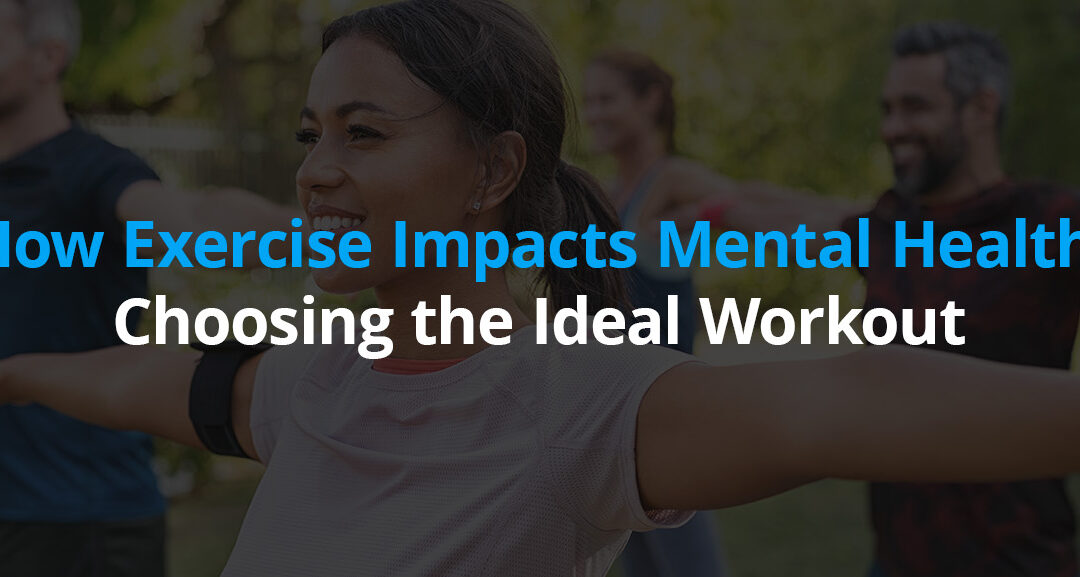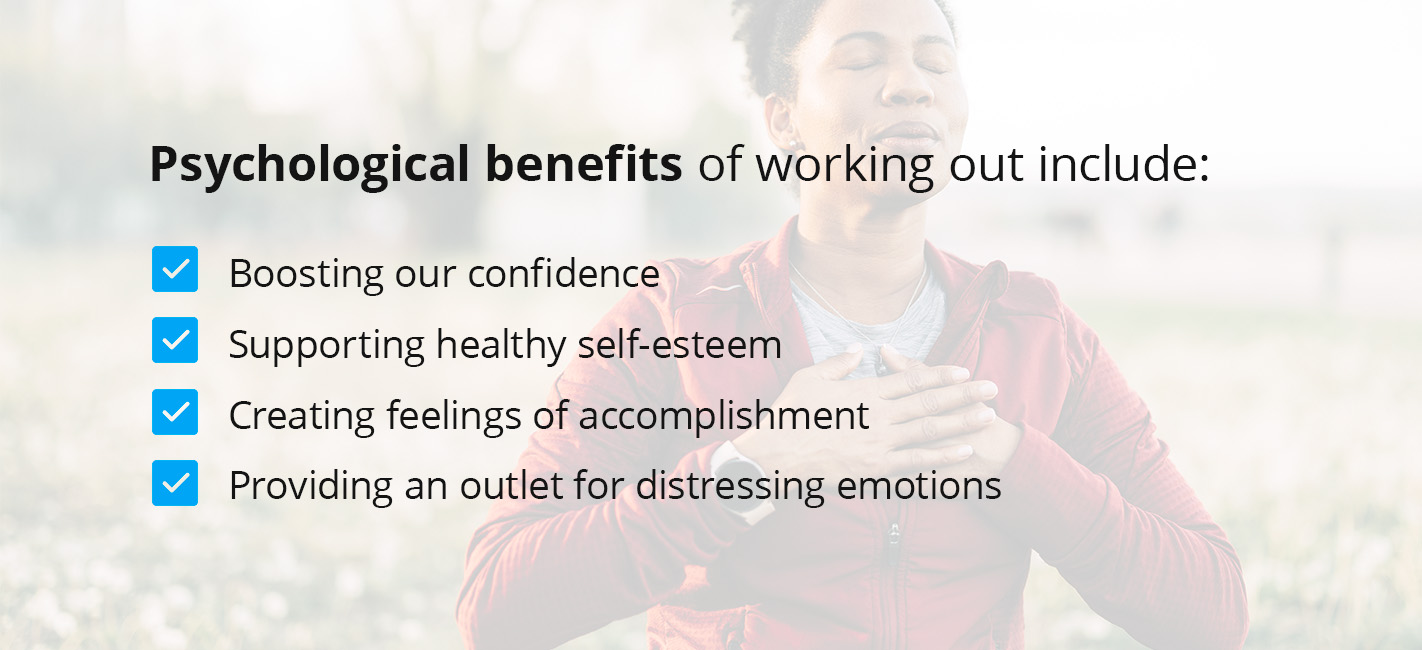How Does Exercise Impact Mental Health?
The World Health Organization (WHO) recommends at least 150 minutes of weekly physical activity for adults, including a minimum of two muscle strength training sessions per week. They recommend regular exercise for mental and physical well-being, citing brain health and mood regulation as key benefits. Studies show that regular physical activity helps our psychological resilience in several vital ways:
Exercise Helps Relieve Stress
For many years, endorphins have been praised for the blissful state you enter after a good workout, sometimes called “runners’ high.” However, new research suggests that endocannabinoids, not endorphins, cause exercise’s euphoric and stress-relieving effects. While endorphins can’t cross the blood-brain barrier, endocannabinoids can. Endocannabinoids from exercise have been shown to:
- Reduce anxiety symptoms
- Increase neuroplasticity
- Promote dopamine and serotonin
- Improve memory and cognition
Exercise Lifts Your Mood
While going for a run may be the last thing you feel like doing when you’re in a slump or going through more severe mood changes like depression, studies show that it’s worth it. Physical activity regulates neurotransmitters responsible for mood and helps support healthy executive function. Working out can also reduce chronic inflammation, a condition commonly associated with depression.
The most intriguing aspect of exercise’s effect on the brain is how it promotes the development of new neurons, a process called neurogenesis. The hippocampus is a part of the brain responsible for regulating mood, and scans reveal smaller hippocampi in the brains of people with depression. Exercise helps support cell growth factors in the brain, encouraging neuron growth in the hippocampus and reducing symptoms.
Exercise requires perseverance, focus and consistency, so it’s a brilliant tool for learning and internalizing these valuable life skills. Psychological benefits of working out include boosting our confidence, supporting healthy self-esteem, creating feelings of accomplishment and providing an outlet for distressing emotions.
Exercise Encourages Social Bonding
Whether you’re part of an aerobics class, going to the gym or playing in a soccer team, exercise can bring like-minded people together and create a sense of community and belonging. Because humans are inherently social creatures, the isolation that comes with depression and other mental health challenges can significantly exacerbate symptoms, and exercise is a brilliant way to combat it.
Exercise Improves Sleep Quality
Good sleep is essential for maintaining a healthy mood, memory and cognition. Many studies have shown that adding regular moderate exercise to people’s routines improves their sleep quality, especially for those living with mental illness. Exercise helps you sleep better because it can:
- Boost melatonin: Melatonin is the hormone that helps you fall asleep and keeps you asleep for longer.
- Reduce stress: Exercise lowers cortisol levels, a hormone associated with increased anxiety and difficulty sleeping.
- Regulate body temperature: The spike and subsequent dip in body temperature during and after activity encourages sleepiness.
What Type of Exercise Is Right for Me?
Exercise builds four critical aspects of your body composition — strength, endurance or “cardio,” balance and flexibility. These complement the beneficial social and psychological facets of working out. While anything that gets your blood pumping and your muscles moving is valuable, some physical activities target specific aspects more thoroughly and are better suited to different personalities, preferences and lifestyles.
Running for Mental Health
Running is excellent cardiovascular exercise and helps build endurance. The practice also provides a fantastic opportunity to leave the house, break the monotony of isolation and experience nature. Joining a running group can build social bonds, while solo running is a great way to enjoy some me-time and wind down from a stressful work, family or school day. Studies show that regular, moderate running can improve mental health in people of various genders, ages and fitness levels.
Weight Lifting for Mental Health
Weight lifting is great for strength training and can immensely improve your quality of life. When you train your muscles with the correct posture, you make your body more capable of safely and efficiently carrying out day-to-day tasks, like climbing the stairs, carrying bags and supporting your weight as you move. This renewed bodily control can be empowering and reduce injuries.
New research into strength straining suggests that exercises like weight lifting can reduce the symptoms of anxiety and depression in youthful people with psychosocial challenges through neurogenesis, hormone balance and other factors. Also, on a more psychological level, while trauma and feelings of powerlessness can be disenfranchising, gradually building strength through lifting weights returns a sense of agency and control to people’s lives.
Swimming for Mental Health
Swimming has long been touted as the best form of endurance exercise because of its various benefits. It’s easy on the joints, carries a lower injury risk and engages many core muscle groups while providing cardiovascular exercise. Swimming is also a vital life skill that opens doors to new, fun leisure activities and makes you feel secure around water. Studies show that even light swimming can improve mood and decrease anxiety.
Sports for Mental Health
Sports — particularly team sports — bring people together and unite them under a common goal. They arguably provide the best social benefits of all workouts for mental health and contribute to endurance, balance, strength and flexibility. Being part of a team fosters connections, community, and friendships, which are invaluable assets to people working through mental health challenges.
Striving for success and achieving it through a basketball match or squash game can motivate you, boost your self-esteem and reinforce perseverance and resilience in the brain. This is particularly valuable if you’re feeling downtrodden by setbacks in your personal or professional life.
Yoga and Qi-Gong for Mental Health
Yoga and qi-gong are two exercises that integrate mindfulness, meditative breathwork and flexibility into physical activity. Both have been practiced for thousands of years to enhance well-being and unite the mind and body through intentional movement. Light yoga and qi-gong are great for people with movement challenges and older adults who want holistic, low-impact exercise options.
- Yoga: Yoga originated in India as a spiritual practice but has shown immense promise for mental and emotional health along with flexibility, pain relief and chronic disease symptom management.
- Qi-gong: Qi-gong was developed in China and is similar to tai-chi but focuses more on well-being. It has exhibited good results for improving cognitive function and reducing anxiety and depression symptoms.
How Can I Maximize Exercise’s Mental Health Benefits?
To get the most out of your workouts for mental health, you should supplement your exercise regimen with other physically and psychologically beneficial routines. These include:
- Eating a balanced, nutritional diet: Your body needs enough energy, micronutrients and protein to fuel your cells, support your metabolism and help repair and build muscle. This is especially important when you exercise regularly.
- Checking in with your body: Ensure you give yourself time to rest after physical activity. Speak to a doctor about any pain during or after your workout to prevent injury and find the best exercises for your body’s needs.
- Seeing a therapist: Work with a licensed counselor to consolidate the social and psychological progress you’ve made during exercise. They will help you navigate your goals, reservations and feelings surrounding your new routine.
Thrive With Help From Merrimack Valley Psychological Associates
The licensed mental health professionals at Merrimack Valley Psychological Associates provide compassionate support using science-backed methodologies. From managing anxiety and depression to grief counseling and addiction recovery, our team has the expertise to guide you through life’s toughest challenges.
Questions about starting therapy? Head over to our Frequently Asked Questions page for all the details you need. Enhance the mental health benefits of your new active lifestyle by scheduling an appointment with us today.



